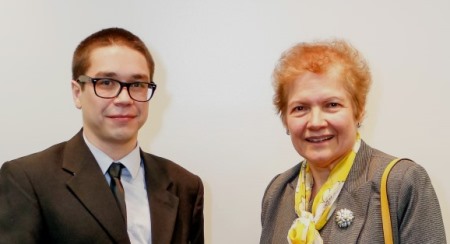
Blanca G. Silvestrini, an attorney and historian, who recently retired from the History Department after 42 years in academics, has spent her professional life reaching out beyond the Ivory Tower and the courtroom to students, refugee children and repressed women, among other groups.
This spring, Jorell Meléndez-Badillo, a Ph.D. candidate in history, had the opportunity to talk to Professor Silvestrini about her career and her plans for the future.
As she told Meléndez-Badillo, in the interview “my heart beat history, my thought is legally oriented and I have always aspired to reach out to people, whether inside or outside of the classroom.”
Silvestrini will continue her active research life into Caribbean culture and society with an “emphasis on people, real people living in the region but also people on the move.”
Silvestrini received a doctorate in history from SUNY-Albany; her interests in law and society in Puerto Rico led her to earn a law degree and J.S.M. from Stanford University.
The two academic degrees mesh perfectly with Silvestrini’s philosophy and research focuses.
“My teaching and research have gone hand in hand,” she told Meléndez-Badillo. “I approach law as a historical product and research how it affects change in society. “ She gave as an example her course in Latinos/as and Human Rights in which she emphasized changes, influences, contradictions, successes and failures of social movements.
She said teaching, which she began at age 26 at the University of Puerto Rico, sustains her. Despite administrative jobs in academia, she has always returned to the classroom.
She defined teaching as a “reciprocal process” in which students and faculty give to each other. Young people, she said, “force you to think in a different way … (they) anchor you in the present, ask questions you hadn’t thought about and drive your creativity to a new level.”
She reminds her students that young people created the civil rights movements and have been leaders of their times.
In the classroom, her mantra was “history is about real people,” always encouraging students to think of themselves, their families and their communities “as part of history.”
Predictably, a teacher first led Silvestrini to pursue history – a turning point in her life that should remind all students of the value of the core curriculum. She had entered undergraduate studies as a math major but an opening in a Renaissance history course, required to take, turned into a breakthrough experience when, knowing her interest in science, her professor suggested she read a biography of Leonardo da Vinci.
It was the first “real” history book she had ever read and its impact was so great she switched majors to history. That professor became “my role model,” she said. “Beyond content, he taught me how to be a historian.”
It is a role Silvestrini has taken on for countless undergraduate and graduate students, who, like herself, she has required to diversify their studies by reading novels and ethnographies and analyzing films, legal cases and statistics.
Her focus on interdisciplinary studies was intensified as part of a faculty group that helped create the UConn Human Rights Institute, founded in 2003 by eight Liberal Arts and Sciences academic departments and the Schools of Business and Law to advance the study and teaching of human rights. It now has healthy major and minor programs.
Professor Silvestrini has “mentored a generation of historians, social scientists and legal scholars,” wrote Meléndez-Badillo in the introduction to his interview with her.
“Working closely with her at the University of Connecticut has transformed my conception of the uses of historical scholarship can have within and beyond the ivory tower,” he continued.
A review of Silvestrini’s scholarship and publications makes clear the breadth and depth of her interests.
Among her books, in Spanish and English, are studies of female resistance, the politics and violence and criminality of Puerto Rico and the Caribbean as well as the history of that region of the hemisphere. Her countless journal articles take long looks at research resources in Puerto Rico, Latino culture and civil rights, working conditions for women and the Puerto Rican legal system, among other topics.
She is also a practicing attorney and serves as a counselor-at-law and consultant attorney in cases related to immigration and Puerto Rican family and inheritance law for a Cambridge, Mass.-based law firm.
And although she is leaving the classroom for now, Silvestrini’s creative mind continues to lead her in new directions of research and activism.
These fields include legally representing Central American refugee children, health and citizenship in Puerto Rico (the subject of her latest book), and, in a unique avenue of investigation, the cuisine of Puerto Rico at the turn of the 20th century when profound cultural and societal changes were taking place.
“The question brings together the social and economic transformations from an agricultural to an industrial society, the impact of the transition fro Spanish to American colonials, the incorporation of women in the work force … and the expansion of the state powers into education, public health and urbanization,” she told Meléndez-Badillo. As weighty as these investigations sound, Silvestrini also said she plans to have some “fun” with the project by finding recipes and collecting stories.
How entertaining and educational it will be for all historians to read the results of this undertaking. Thank you, Blanca Silvestrini, for your continued mentoring and work in the field of history.
Jorell Meléndez-Badillo, a PhD candidate in History, interviewed his advisor Professor Blanca Silvestrini in Spring 2016. Meléndez-Badillo is accomplished in his own right: he is a 2016-17 recipient of the Ford Foundation Dissertation Fellowship.
Terese Karmel, Department of Journalism, wrote this article.